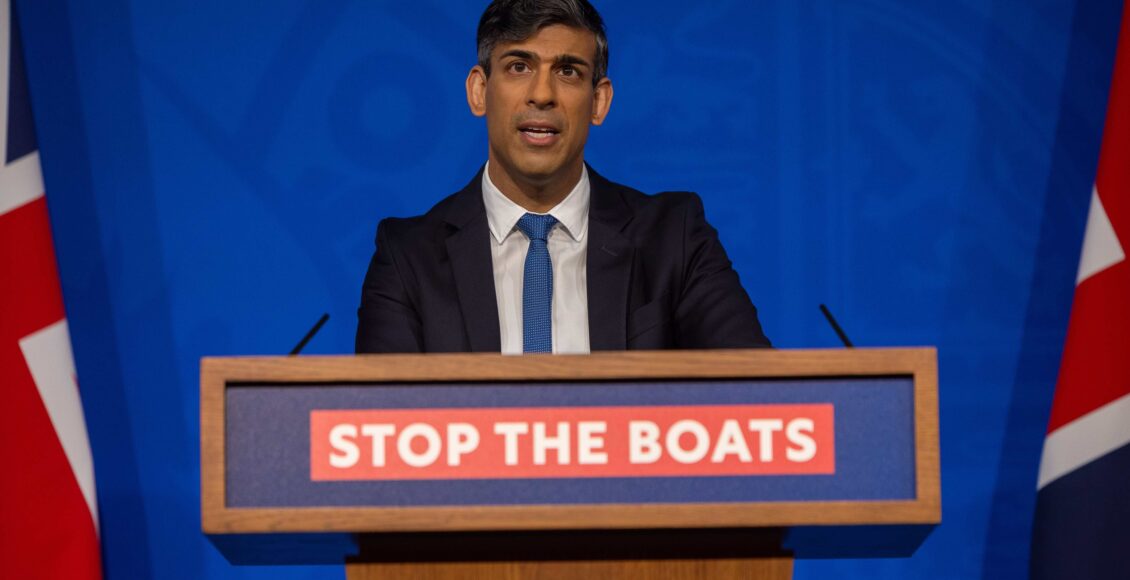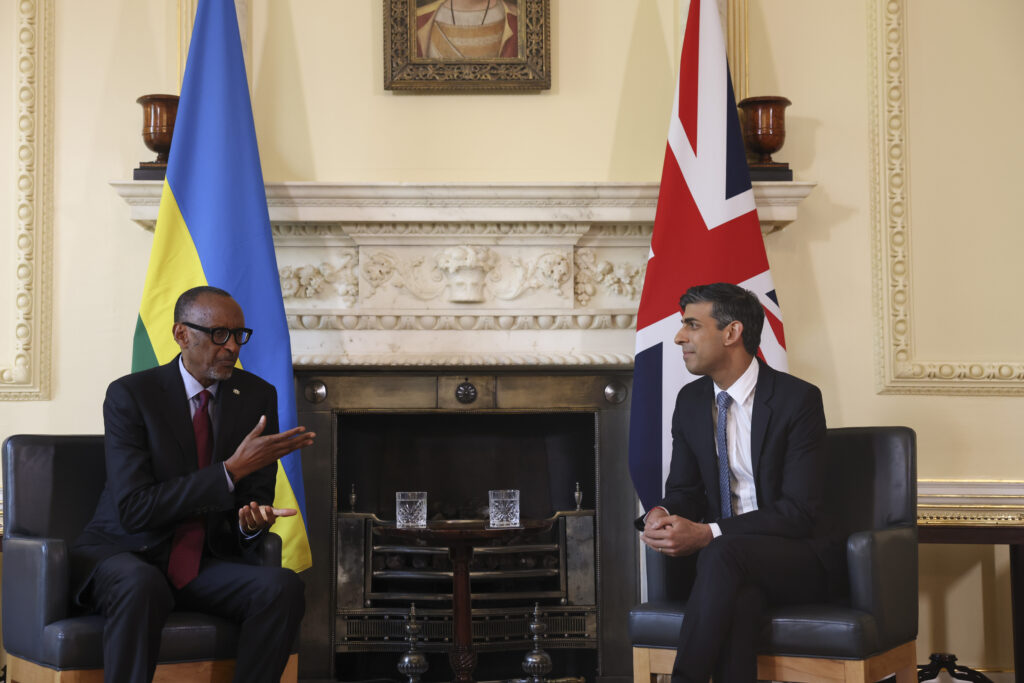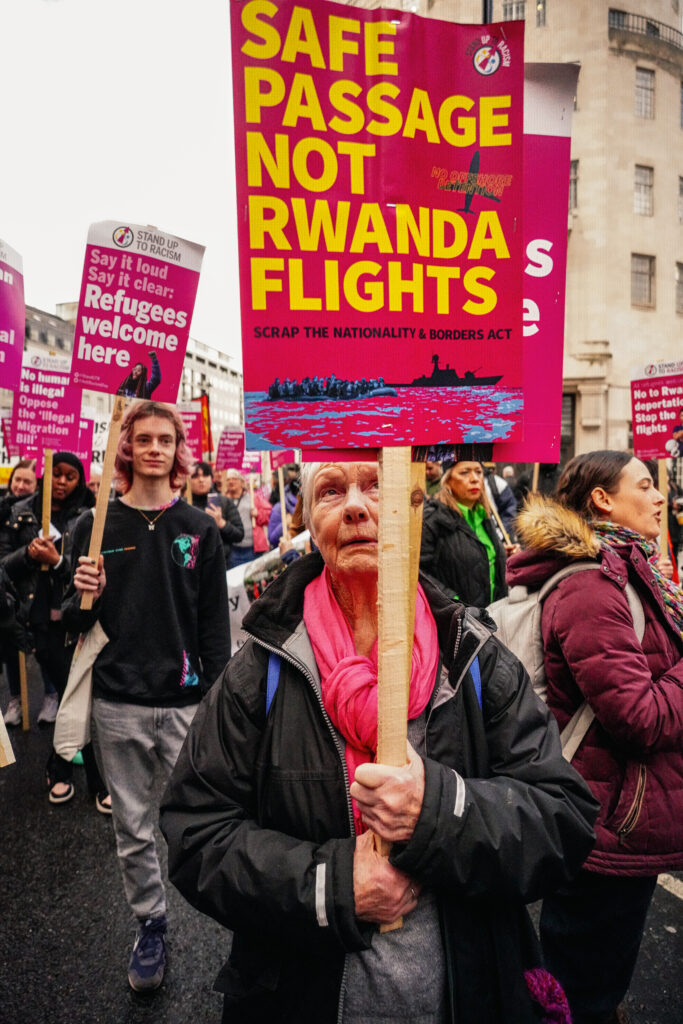‘Dead and Buried Before it Started’: The Cautionary Tale of the Farcical Rwanda Bill
 Prime Minister Rishi Sunak discussing the Rwanda Bill at a press conference in April 2024. “The Prime Minister holds a press conference on migration” by Simon Walker is licensed under CC BY-NC-ND 2.0.
Prime Minister Rishi Sunak discussing the Rwanda Bill at a press conference in April 2024. “The Prime Minister holds a press conference on migration” by Simon Walker is licensed under CC BY-NC-ND 2.0.
After a landslide victory in July, Prime Minister Keir Starmer of the UK’s newly elected Labour government announced that one of his government’s first actions will be to scrap former Conservative Prime Minister Rishi Sunak’s Rwanda Bill — an important issue in the recent election. The bill would have mandated that asylum seekers attempting to cross the English Channel by boat be sent to Rwanda. There, over 11,000 kilometers away from the UK, their asylum claims would be processed without the guarantee of approval, nor the possibility of re-entry to the UK. If an asylum seeker was successful, their asylum would be granted in Rwanda and they would still be unable to return to the UK.
While the Rwanda Bill emerged recently, primarily as a response to the record number of irregular crossings of the English Channel, the idea to send incoming migrants abroad has been brewing in the UK since the turn of the century. In 2003, then-Home Secretary David Blunkett, responsible for matters such as policing, immigration and national security, proposed a number of potential offshore asylum policies. This included the creation of “regional protection zones,” set up near conflict zones and controlled by the UNHCR to process asylum claims outside the EU. Another of Blunkett’s proposals was the creation of “transit centres” in countries such as Somalia, Morocco and Türkiye, which would, again, serve to process asylum claims before their seekers reach the EU.
However, it would take nearly 20 years and the UK leaving the EU for hypothetical plans to be actualized into concrete policy proposals. In 2021, under former Conservative Prime Minister Boris Johnson, reforms were announced to allow for asylum processing to take place outside the borders of the UK. During a speech to the nation in April 2022, Johnson unveiled the UK and Rwanda Migration and Economic Development Partnership, which ultimately became known as the Rwanda Bill. While Johnson’s time in office was short-lived, as he was toppled for misconduct in a rebellion by his own party just a few months later, the Rwanda Bill lived on.
The revolving door of Conservative Prime Ministers and Home Secretaries that soon followed increasingly committed resources and political capital to seeing the Rwanda Bill become a reality. Suella Braverman, who sits on the ideological right-wing of the Conservative Party and served as Home Secretary under both Prime Ministers Liz Truss and Rishi Sunak, declared that she would love to see a plane taking off to Rwanda on the cover of The Telegraph, and that the execution of the Rwanda Bill was her “dream” and “obsession.” Despite facing challenges in the courts and significant criticism from all sides of the political spectrum, it was Sunak who ultimately succeeded in passing the bill on April 22nd 2024, coming closest to seeing Braverman’s dream and obsession come true.

The Rwanda Bill, in its final form, would have been financially lucrative for Rwanda, as the UK agreed to millions of pounds in payments to support economic growth in the country, as well as payments per individual sent to Rwanda. According to a report from the UK’s National Audit Office, the total amount paid to Rwanda would total £370 million. Though the Rwanda Bill was short-lived, or, in the words of Prime Minister Starmer, “dead and buried before it started,” it is unlikely the bill would even have been effective at deterring asylum seekers and small boat migration in the first place.
A look at similar offshore asylum policies offers a clearer picture of the inefficacy of such bills. The most notable example is the Pacific Solution, Australia’s offshore asylum policy which sent asylum seekers to the island nation of Nauru on and off for a period of nearly two decades. In the case of Australia, there was “no noticeable change in the rate of arrival of migrants,” and it is probable that the outcome of the Rwanda Bill would have been the same for the UK. An explanation for the failure of offshore asylum policies to deter migration is that deterrence policies have been shown to significantly overestimate migrants’ knowledge of potential sanctions associated with migration. Furthermore, asylum seekers are more likely to weigh the certainty of harm of staying in their home countries as a much greater harm than the uncertainty of being sent to a third country such as Rwanda. In an impact assessment, the UK’s Home Office itself acknowledged the lack of academic consensus on the efficacy of offshore asylum policies at deterring migration.
In addition to being ineffective, offshore asylum policies tend to be laced with human rights abuses. Australia’s Pacific Solution amassed a concerning number of condemnations from human rights organizations, with Amnesty International, Human Rights Watch, and Doctors Without Borders denouncing its human rights abuses, in the form of sexual violence, assault, and neglect. The program was also criticized for neglecting mental health and inflicting psychological distress.

Beyond the human rights abuses, policies such as the Rwanda Bill directly violate international human rights laws. Offshore asylum policies violate the concept of non-refoulement under Article 33 of the United Nations’ 1951 Refugee Convention, which declares that no state “shall expel or return a refugee in any matter whatsoever to the frontiers of territories where his life or freedom would be threatened.” In unanimously declaring the bill unlawful in November of 2023, the UK’s supreme court pointed to Rwanda’s history of refoulement (i.e. returning asylum seekers to the same countries in which they sought asylum from). Shockingly, this is not the first time a supreme court has found that Rwanda as a destination for this type of policy is a violation of human rights. In 2018, due to human rights concerns, Israel’s supreme court suspended its Voluntary Departure program that saw asylum seekers sent to both Rwanda and Uganda. However, while Israel’s plan was axed by the government, Sunak’s government attempted to legislate away concerns of refoulement by declaring Rwanda a safe destination so that the bill could ultimately pass.
Thus, the Rwanda Bill would never have achieved its central policy objectives. It was highly likely to have come with significant human rights abuses, and it was in direct violation of international human rights law. What, then, was the purpose of the bill? The cynical answer is that the Rwanda Bill existed solely to win the Conservatives political points. After 14 years of Conservative rule marred by economic stagnation, a myriad of scandals, and significant political instability, the Rwanda Bill was a gimmicky policy which can be added to a long list of proposals suggested merely for the sake of PR. While offshore asylum policies are ineffective at curbing migration, they fuel exclusionary rhetoric against already established migrants and asylum seekers. What the farce of the Rwanda Bill ultimately achieved was the appeasement of a vocal right-wing faction of the Conservative base eager for a crackdown on migration. Although vocal, this sentiment was not shared by the whole of the UK’s population.
As the impending adoption of the Rwanda Bill loomed over asylum seekers already in the country, one asylum seeker described feeling like he and fellow asylum seekers were being used as a “political football.” Caught in the middle of a political debate once again, migrants faced discrimination from the government, and were used as scapegoats in the recent election. Ultimately, since the bill was scrapped, the problem of illegal migration was not solved, hundreds of millions of pounds of taxpayer money was wasted, and migrants were once again caught in the middle of a political debate. There were no winners in this particular football match – all involved lost.
Edited by Rafay Ahmed
